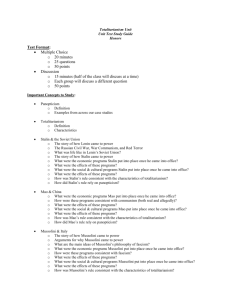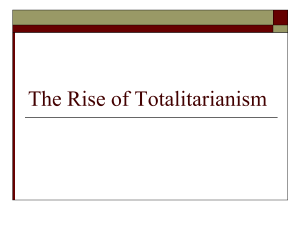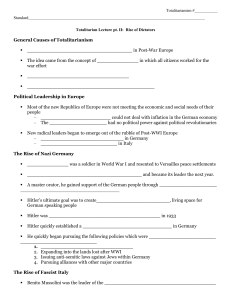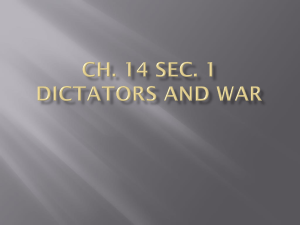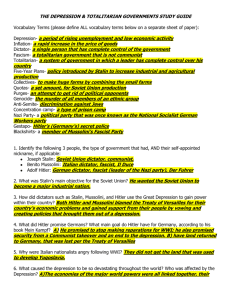Totalitarianism Unit 2013-2014 - Study Guide
advertisement
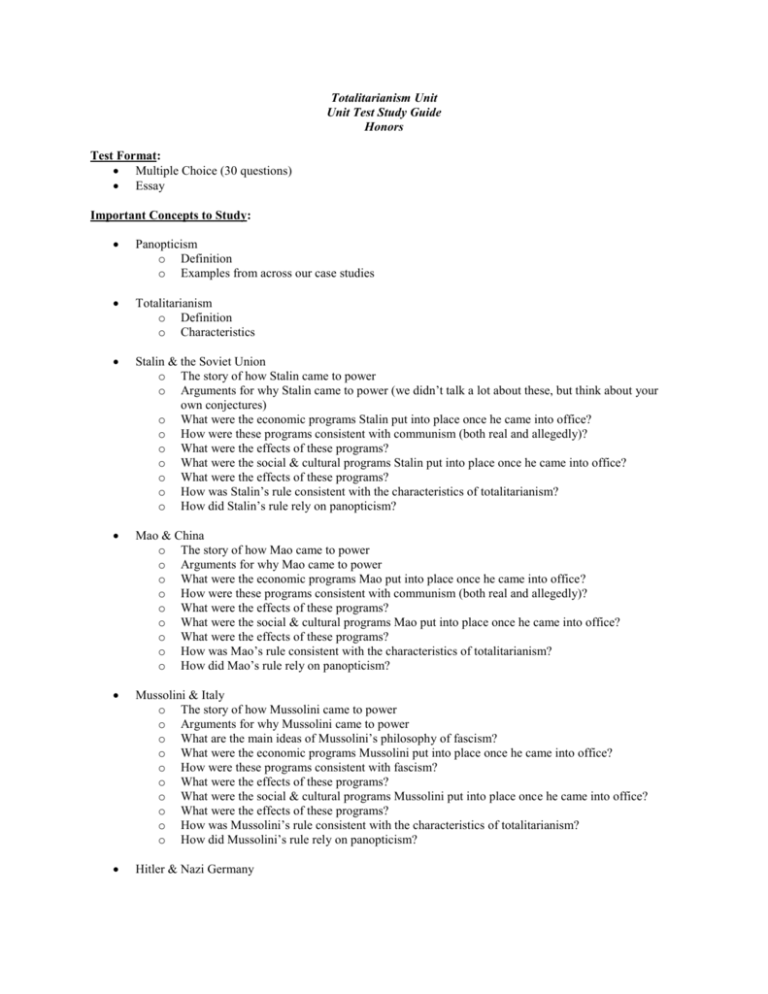
Totalitarianism Unit Unit Test Study Guide Honors Test Format: Multiple Choice (30 questions) Essay Important Concepts to Study: Panopticism o Definition o Examples from across our case studies Totalitarianism o Definition o Characteristics Stalin & the Soviet Union o The story of how Stalin came to power o Arguments for why Stalin came to power (we didn’t talk a lot about these, but think about your own conjectures) o What were the economic programs Stalin put into place once he came into office? o How were these programs consistent with communism (both real and allegedly)? o What were the effects of these programs? o What were the social & cultural programs Stalin put into place once he came into office? o What were the effects of these programs? o How was Stalin’s rule consistent with the characteristics of totalitarianism? o How did Stalin’s rule rely on panopticism? Mao & China o The story of how Mao came to power o Arguments for why Mao came to power o What were the economic programs Mao put into place once he came into office? o How were these programs consistent with communism (both real and allegedly)? o What were the effects of these programs? o What were the social & cultural programs Mao put into place once he came into office? o What were the effects of these programs? o How was Mao’s rule consistent with the characteristics of totalitarianism? o How did Mao’s rule rely on panopticism? Mussolini & Italy o The story of how Mussolini came to power o Arguments for why Mussolini came to power o What are the main ideas of Mussolini’s philosophy of fascism? o What were the economic programs Mussolini put into place once he came into office? o How were these programs consistent with fascism? o What were the effects of these programs? o What were the social & cultural programs Mussolini put into place once he came into office? o What were the effects of these programs? o How was Mussolini’s rule consistent with the characteristics of totalitarianism? o How did Mussolini’s rule rely on panopticism? Hitler & Nazi Germany o o o o o o o o o o o o o Be able to describe what life was like in Nazi Germany in the following areas and why some people perceived Germany to be experiencing a crisis in these areas: Art/Culture Economics Politics Foreign Sentiment / Anti-Semitism Gender/Sexuality/Sex Modernization/Industrialization The story of how Hitler came to power Arguments for why Hitler came to power What are the main ideas of Hitler’s philosophy of Nazism? What were the economic programs Hitler put into place once he came into office? How were these programs consistent with Nazism? What were the effects of these programs? What were the social & cultural programs Hitler put into place once he came into office? What were the effects of these programs? What were Hitler’s foreign policy actions between 1933 and 1939? What was the international response to these actions? How was Hitler’s rule consistent with the characteristics of totalitarianism? How did Hitler’s rule rely on panopticism? ESSAY QUESTION ON NEXT PAGE! Essay Question: Use the following poem to make an argument about ONE of the following: 1. 2. 3. 4. The role of gender in totalitarian regimes The nature of freedom in totalitarian regimes The use of record-keeping and monitoring in totalitarian regimes The role of economic prosperity in totalitarian regimes The Unknown Citizen, W. H. Auden (1939) (To JS/07 M 378 , This Marble Monument Is Erected by the State) He was found by the Bureau of Statistics to be One against whom there was no official complaint, And all the reports on his conduct agree That, in the modern sense of an old-fashioned word, he was a saint, For in everything he did he served the Greater Community. Except for the War till the day he retired He worked in a factory and never got fired, But satisfied his employers, Fudge Motors Inc. Yet he wasn't a scab or odd in his views, For his Union reports that he paid his dues, (Our report on his Union shows it was sound) And our Social Psychology workers found That he was popular with his mates and liked a drink. The Press are convinced that he bought a paper every day And that his reactions to advertisements were normal in every way. Policies taken out in his name prove that he was fully insured, And his Health-card shows he was once in hospital but left it cured. Both Producers Research and High-Grade Living declare He was fully sensible to the advantages of the Instalment Plan And had everything necessary to the Modern Man, A phonograph, a radio, a car and a frigidaire. Our researchers into Public Opinion are content That he held the proper opinions for the time of year; When there was peace, he was for peace: when there was war, he went. He was married and added five children to the population, Which our Eugenist says was the right number for a parent of his generation. And our teachers report that he never interfered with their education. Was he free? Was he happy? The question is absurd: Had anything been wrong, we should certainly have heard.
